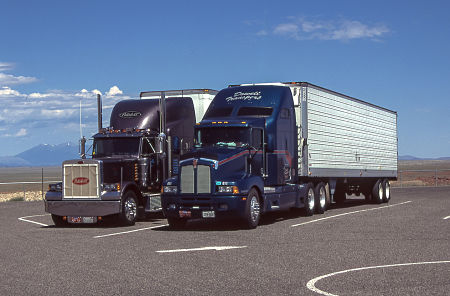ATA says trucking has kept America moving during pandemic
American Trucking Associations’ (ATA) CEO Chris Spear told a recent Management Conference audience that the trucking industry’s response to the COVID-19 pandemic has kept the nation’s interstate commerce rolling.
“While others in DC panicked, the ATA led, giving direction and certainty to our members when it mattered most,” Spear said in his annual State of the Industry address, citing ATA’s successful efforts in securing federal “essential” status for carriers and keeping facilities open for drivers—both of which were critical to maintaining the flow of interstate commerce while the county locked down.
“Our combined efforts have helped put America on a path to full recovery,” he said.
Spear said the challenges of 2020 have served to strengthen the ATA Federation, calling it “battle-hardened” as it looks to tackle several priority issues in the consequential year ahead. Among them, he said ATA will continue pursuing tort and legal reform, addressing the shortage of drivers and technicians, and fighting for long-term funding for our national infrastructure.
“Our efforts this year on infrastructure produced a comprehensive bill in the House of Representatives–movement that paves way for passing comprehensive reform next year, regardless of who voters elect next week,” he said.
Success, Spear said, depends on funding that “cannot and will not be done via truck-only tolls,” emphasizing the paramount importance of ATA’s suit against Rhode Island to block the state’s truck-only toll scheme.
Spear also said expanding the industry’s workforce remains a top priority. This includes continued support for the Drive SAFE Act and the FMCSA pilot program for drivers under the age of 21, but also a new focus on expanded outreach to minority communities.
“2020 opened our eyes to the importance of diversity, and the trucking industry is no exception. To that end, ATA established a diversity working group in direct support of the Workforce Development Policy Committee,” he said. “This group will shine a brighter light on our efforts to expand urban hiring, including people of color and women; and, look at initiatives that increase the number of minorities in our executive ranks, including partnerships with Historically Black Colleges and Universities.”
In closing, Spear said because of the industry’s response to 2020’s challenges, it is “no surprise that America has awakened to the trucking industry.”
“Together, we inspire others. Together, we will win and grow. And we will always answer the call when our country needs us most. Trucking isn’t just the backbone of our economy – it’s the heartbeat of this nation,” he said.
ATA’s latest U.S. Freight Transportation Forecast predicts freight volumes will grow around 36 percent over the next 11 years. The most recent report, which is a partnership between ATA and IHS Markit, begins with a 2019 baseline and then projects through 2031 the amount of tonnage to be hauled, the revenue collected from those volumes by mode, as well as retail truck sales over that period, and the number of Class 8 vehicles in operation.
“Like the last several editions, we have included historical data for all modes of freight transportation back to 1990,” explained ATA Chief Economist Bob Costello in the report’s opening message. “The historical data is especially useful for gauging growth in each transportation mode, the magnitude of contraction during the recessions, as well as understanding modal share shifts over time.”
According to IHS Markit, total truck tonnage, including for-hire and private carrier operations, hit 11.84 billion tons in 2019, the highest level on record. As of last year, total truck tonnage was up 39 percent from the low in 2009.
“Even with the impact of the pandemic, total freight tonnage is projected to grow 21.7 percent over the forecast period, while total freight transportation revenue is forecasted to surge 45.7 percent by 2031,” Costello said.






